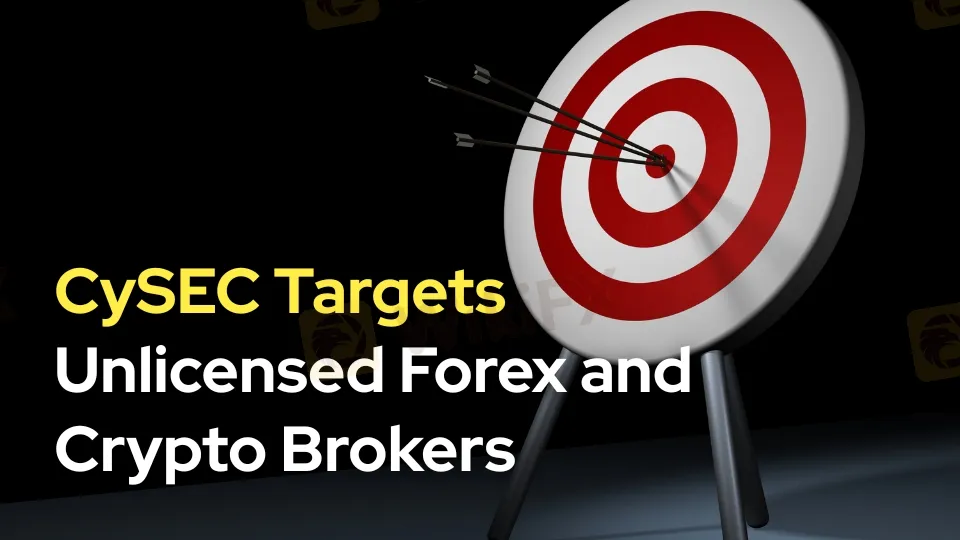简体中文
繁體中文
English
Pусский
日本語
ภาษาไทย
Tiếng Việt
Bahasa Indonesia
Español
हिन्दी
Filippiiniläinen
Français
Deutsch
Português
Türkçe
한국어
العربية
CySEC Targets Unlicensed Forex and Crypto Brokers
Abstract:CySEC blacklists unlicensed brokers like admiralmarket.net in the forex and crypto markets. Strict new rules impose hefty fines. Verify brokers to stay safe.

The Cyprus Securities and Exchange Commission (CySEC) is getting tough on shady brokers, putting out a strong warning about several unlicensed companies in the forex and cryptocurrency markets. These firms, running without CySECs okay, are now on a blacklist for offering trading services that could harm investors.
Heres the list of banned websites:
- athloscapitalinvest.com
- fxfuturetrade.net
- dts-trade.com
- fax.trade
- circlemarketfx.com
- admiralmarket.net
- kulanient.com
- eliteglobalfx.com
- elitefxgo.com
- mavqeris.com
- fasatgh.com
- gosuncm.com
- lyreasf.com
- yondaris.pro
One sneaky site, admiralmarket.net, copies the look and branding of the real, CySEC-approved Admiral Markets to trick people into thinking its legit. CySEC is calling out these shady moves, pointing out that some unlicensed firms pretend to be linked to Cyprus Investment Firm (CIF)-licensed brokers to seem trustworthy.
CySEC‘s new rules are stricter, especially for companies dealing with crypto. Every firm handling cryptocurrencies has to register with CySEC, or they’ll face big trouble—fines up to $370,000 (€350,000), jail time for up to five years, or both. This shows CySEC is serious about keeping investors safe from scams in risky markets.
CySEC‘s recent study on how everyday investors act found some worrying patterns. Lots of people don’t dig deep into the products or companies they‘re investing with. Only 30% checked if their broker was licensed on a regulator’s website. A full 15% didn‘t check anything at all. More than half trusted company reviews or the firm’s own website, which might not tell the whole story. Even worse, 7% spent less than 30 minutes—or no time—researching before putting money in.
The growing trend of “gamification” in trading is also a red flag. Flashy apps make investing look like a fun game, but they often hide the real risks, luring people with promises of easy cash. CySEC is fighting back with a campaign to teach Cypriots about the dangers of unregulated trading apps and why checking a brokers license matters.
CySEC also warns about “finfluencers” and slick marketing that can mislead investors. They‘re pushing people to do their homework and check a broker’s status on CySECs website to dodge scams. The blacklist is a handy tool to spot fake websites and make smarter choices.
As Cyprus beefs up its rules, CySEC‘s efforts show they’re all in on protecting everyday investors from the dangers of sketchy markets. The advice is clear: stay sharp, do your research, and stick with licensed brokers to keep your money safe.

Disclaimer:
The views in this article only represent the author's personal views, and do not constitute investment advice on this platform. This platform does not guarantee the accuracy, completeness and timeliness of the information in the article, and will not be liable for any loss caused by the use of or reliance on the information in the article.
Read more

Mule Accounts: The Secret Weapon Fake Forex Brokers Use to Dupe Investors
Explore this story where we have highlighted how fake forex brokers use mule accounts to dupe investors.

Fraud Brokers List for July 2025- EXPOSED
Attention investors and traders! If you want to invest in the forex market, be careful not to choose these scam brokers. This warning list is issued by the Financial Conduct Authority.

Know the Major Risks of UbitMarkets, Before You Invest!
Scam brokers involved in the forex market who act genuine in the beginning but turn out to be frauds in the end. Choosing UbitMarkets could lead you to serious losses. Check out this article to know why we’re saying this.

What WikiFX Found When It Looked Into Decode Global
In the evolving world of online trading, regulatory oversight and physical office verification serve as two key markers for evaluating a broker’s operational integrity. Decode Global is one such entity that holds multiple licenses and has undergone location-based verification.
WikiFX Broker
Latest News
Global stock markets are calling Trump's bluff on tariffs
Trump's tariffs overshadow the pomp and pageantry as Macron meets King Charles
Boeing delivers most airplanes since late 2023 after ramping up 737 Max output
Inflation expectations drift back down to pre-tariff levels, New York Fed survey shows
10 Unlicensed Brokers Exposed – Check Now to Stay Safe!
Exposed: Ibell Markets - A Scam Broker That Does Not Allow Withdrawals
Gold Prices to Fluctuate This Week Amid July 9 Tariff Deadline, Fed Policy
America's Deficit Reckoning: How the U.S. debt spiral could spark a crisis
Treasury yields hold steady as Trump extends tariff deadline
Asia-Pacific markets mostly rise as investors assess Trump's steep tariffs
Currency Calculator


